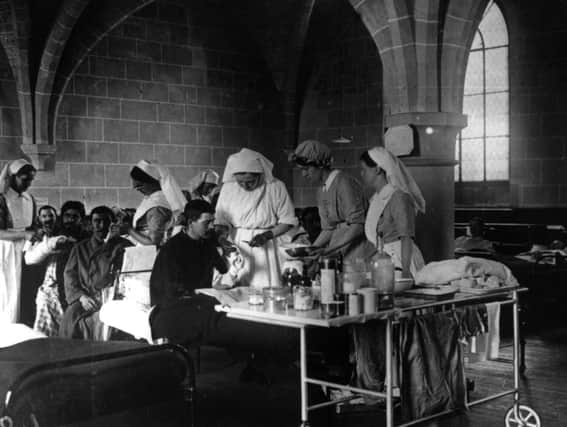Rosemary Goring: Forgotten women on history's front line


This is an anthology of eye-witness accounts, from the Middle Ages to today, which recounts the past through women’s experience. It is not entirely by women, since for centuries it was men who kept the records, but its focus is exclusively on the ways in which women and girls lived, acted and were treated.
A female perspective on history clearly perplexed this man, who asked why such a thing was necessary. The answer is simple. Since, until recently, the nation was run exclusively by men, be it parliament, education, finance or religion, women’s lives and contribution have been largely airbrushed from sight. For 1,500 years and more, unless she was royal, aristocratic, or in holy orders, a woman’s only chance of being recorded for posterity was if she committed a crime. Like the girl on a convict ship bound for Botany Bay, who caught a sailor’s eye with her weeping. For nothing worse than petty theft, she was being transported. She died before the ship docked.
Advertisement
Hide AdAdvertisement
Hide AdI politely explained my reasons for writing the book, but the man remained unconvinced. “We’re trying to find common ground,” he said to my husband, who had joined us, sensing trouble, “and we haven’t yet succeeded.”
It was a reminder that even now women’s equality is not a battle won but an ongoing skirmish. If there are pockets of resistance or incomprehension today, how much worse was it in the days of John Knox or James VI, when queens were not deemed fit to rule, and females taken notice of only if they were witches?
Scotland: Her Story is not a rewriting of history. It is, rather, an attempt to enrich the picture by filling the canvas with those figures who were too often overlooked or ignored. Some of those included are famous, but far more you will never have heard of. Here you will find the children and women who crawled in mine shafts, such as Janet Cumming, 11, from Ormiston Colliery: “The roof is very low; I have to bend my back and legs and the water is frequently up to the calves of my legs. Have no liking for the work. Father makes me like it.” There are farmers’ wives, rebels and anarchists, doctors, spies, Jacobites, nurses, alcoholics, teachers, prostitutes and office workers, their lives bubbling away, out of sight, while men in positions of power made the headlines.
In some cases, it was only the absence of their menfolk that allowed women to prove what they were capable of. In a newspaper interview with one of the first lady tram drivers in 1915 you can almost hear a glass ceiling being shattered: “One more question, Miss Campbell. What answer would you make to the people who still declare that women will never make efficient tram drivers?”
“They are too premature. The fact that there are five of us in Glasgow seems sufficient reply.”
While men were in the thick of battle, so were women. Mary Lee Milne, a Selkirk widow, was cook for Elsie Inglis’s hospital unit on the Russian front in 1916. She turned miserable scraps into tasty meals, making light of the terrible danger. “At tea time they were back again – guns firing and shells flying through the air. For the moment we are all safe – but how long will it last?”
Then there is the stuff that for far too long historians considered unimportant: giving birth, raising children, losing children, and sex. While researching I found an abundance of the visceral facts of life, from the rules governing early midwives to what it feels like having a C-section; from unwanted pregnancies to wives abused by their husbands; from spouses who tried to keep the flame of married sex alight, to others, like Maggie Fuller, who was rare in admitting in the 1930s: “I could count how many times I’ve got anything out of sex. I hate the ruddy thing.”
Scotland: Her Story is published by Birlinn, £20